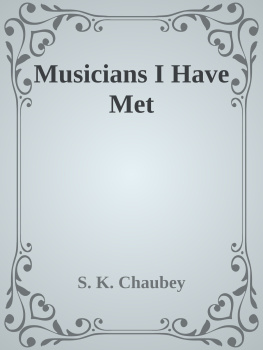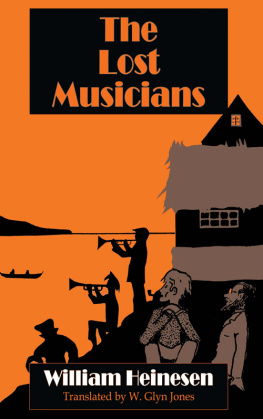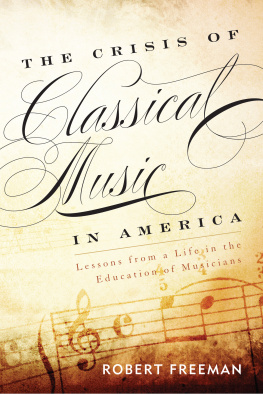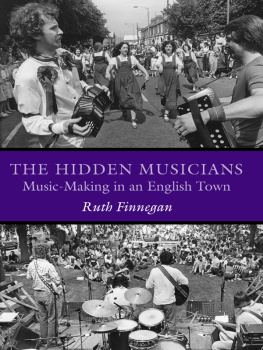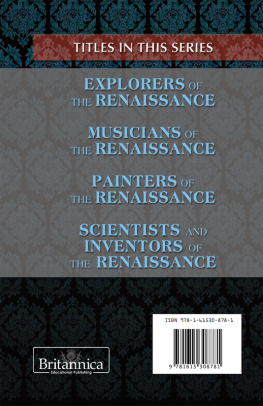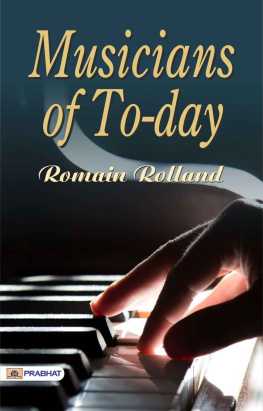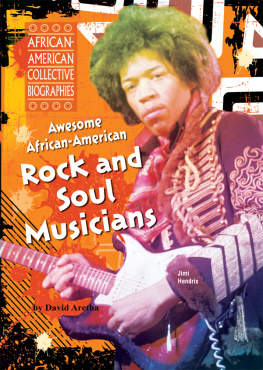S. K. Chaubey - Musicians I Have Met
Here you can read online S. K. Chaubey - Musicians I Have Met full text of the book (entire story) in english for free. Download pdf and epub, get meaning, cover and reviews about this ebook. year: 1958, publisher: Prakashan Shakha, Lucknow, genre: Detective and thriller. Description of the work, (preface) as well as reviews are available. Best literature library LitArk.com created for fans of good reading and offers a wide selection of genres:
Romance novel
Science fiction
Adventure
Detective
Science
History
Home and family
Prose
Art
Politics
Computer
Non-fiction
Religion
Business
Children
Humor
Choose a favorite category and find really read worthwhile books. Enjoy immersion in the world of imagination, feel the emotions of the characters or learn something new for yourself, make an fascinating discovery.
- Book:Musicians I Have Met
- Author:
- Publisher:Prakashan Shakha, Lucknow
- Genre:
- Year:1958
- Rating:4 / 5
- Favourites:Add to favourites
- Your mark:
- 80
- 1
- 2
- 3
- 4
- 5
Musicians I Have Met: summary, description and annotation
We offer to read an annotation, description, summary or preface (depends on what the author of the book "Musicians I Have Met" wrote himself). If you haven't found the necessary information about the book — write in the comments, we will try to find it.
Musicians I Have Met — read online for free the complete book (whole text) full work
Below is the text of the book, divided by pages. System saving the place of the last page read, allows you to conveniently read the book "Musicians I Have Met" online for free, without having to search again every time where you left off. Put a bookmark, and you can go to the page where you finished reading at any time.
Font size:
Interval:
Bookmark:
S. K. Chaubey
M. A., Pfu D. Lucknow University
This collection of Dr. S. K. Chaubeys pen portraits of musicians is being published in the hope that its factual and objective portions will serve the purpose of acquainting a large number of readers with some of the outstanding names in the world of Hindustani classical music and will give them some idea of what has been and is being done in that sphere. General interest in music and other fine arts, which have in the past occupied such an important place in the cultural life of the people of this land, has been growing, and the emphasis that is being placed since the attainment of independence on national development has done much to stimulate it. Information about music, however, is not always readily available to many in a handy form and the present publication may be of help in removing this want to some extent.
Apart from giving details of an informative character about classical music, vocal and instrumental, in the course of these sketches, the writer, who has been associated with some of the well-known musicians of India, has recorded a number of impressions that he has formed as a result of his study and observation. The views he has expressed as a critic are, however, his own and, as he himself says, may not be shared by others. They do not necessarily represent the views of the publishers or of the Government of Uttar Pradesh.
BHAGWATI SARAN SINGH, Director of Information,
The only art, perhaps, which is almost irresistible in its appeal and may indeed be said to be as universal as laughter and tears is music. There exists in this country a rich tradition of music, assiduously built up during several centuries by generations of devoted workers in the field. Nevertheless, taste for first-rate classical music and good popular and folk varieties of music with the stamp of tradition has lately been on the decline. To a large extent, film music is to be held responsible for this change in the standards of appreciation. Not a few of those concerned with film production apparently believe that all that is needed is that their songs should capture the popular imagination, no matter what poetic or musical worth they have. Efforts are, of course, being made in various quarters to raise the standard of appreciation and to systematise classical music as much as possible, although attempts at reform have also sometimes tended to produce what has been described as intellectualised music marked by too much of emphasis on technique. A fight seems to be going on between erotic film tunes and classical songs. It is the inter-action of these forces that will perhaps determine the music of tomorrow.
Appreciation of music inevitably leads us to musicians who interpret it and I have in these pages attempted pen-portraits of some of our well-known musicians. I have tried to consider them in the context of tradition and training and to give a critical appreciation of their art. The choice is more accidental than arbitrary. I have known them all and as a lover of music,
I feel I have a right to record my impressions about them. My views may not be shared by others, but I believe it will be recognized that criticism is in fact discerning appreciation.
S. K. Chaubey
Each age has its great men who sum up its impulses, idiosyncrasies and contradictions. They represent their age very truly and in a manner, fashion it more and more after its own image. Such men are the representatives of their time and interpret its main tendencies very passionately. People rely on them for an authentic interpretation of their age. And it would be paradoxically correct to say that just as a particular period creates them, they also bring that period into being and build it up beautifully with their own hands.
On the other hand, there are great men who are bound down to their age by their own spontaneous passion and humanity and yet in a deeper sense, they do not belong exclusively to it. Great men really belong to ages and generations. In spite of their flesh* and-blood identification with their age, they surpass it, transcend it and belong to a larger humanity and to generations which come and go.
Ustad Faiyyaz Khan belonged to his age and embraced it passionately and yet he belonged to an infinitely more glorious past of our music and its traditions. The roots of Hindustani classical music are its traditionstraditions of a living music built up by generations of musicians, the exponets of style, technique and execution. It is impossible to think of classical music without this background of a living music which specialised in evolving the traditional ghaiana-stylcs and which, in the hands of great masters, owed a never-failing allegiance to the Shastras. Deviations were natural and even indispensable to the advancement of art, but the character and genius of our music were not at all affected.
The gharanas have played a vital role in the development of style, technique and interpretation. Each outstanding and
recognised ghaiana left an indelible stamp on its musicians who transmitted the heritage to their descendants through generations of pupils and followers. One must recognise the great fact that all classical music that is sung and played today, has come down to us through generations of these musicians. Any popular dissemination of music without a background of the traditions embodied in these illustrious families of musicians may fail to achieve the desired success. While there is a great need for popularising the Shastras, I believe there is also need for preserving the remains of the music of the masters.
The Gwalior, Agra and Delhi gharattat have come to be recognised as pioneers of the Khayal style and have also produced great musicians like Haddu Khan, Hassu Khan, Tanras Khan and Ghaghc Khuda Bux and in more recent times, their illustrious descendants and pupils like Rahmat Khan, Alia Fatu of Patiala, Umrao Khan, Ghulam Abbas Khan and Nathan Khan were known as great musicians. Ustad Faiyyass Khan was the intimate flowering of the genius of the Agra style. He summed up in himself the finest traditions of his gha) anas and was its greatest exponent in recent times.
He was born at Sikandra, near Agra, and was initiated into the mysteries of music by his maternal grandfather, Ustad Ghulam Abbas Khan, son of the great Khuda Buxan intimate friend and contemporary of Bairam Khan. lie sat at the distinguished feet of his nana, his guru, and the old master who died at the incredible age of hundred and twenty, saw him mature into a master of the art. Ghulam Abbas Khan not only imparted to him the authentic talim but took him out on a pilgrimage of music, enabling him to visit centres of music and listen to the musicians of the time in whose company he sat and conferred. Such practical experience was necessary to complete his education in music.
But in addition to training and practical experience, there was another happy circumstance which contributed so much to the added splendour of this rising star which moved like a vetitable meteor. It was his native genius, an eternally intangible factor in the destinies of all great men. Here is a story which is authentic in every sense of the word. There arc half a dozen musicians in India today who would remember the incident. Youthful Faiyyaz Khan in his twenties was present in a Mehfil at which the famous Ustad Mian Jan Khan, a pupil of the great Fateh Ali Khan of Patiala, gave his music performance and sang his Khayal in Mullani in his own inimitable fashion. At every Mehfil he was an incalculable factor and it was no joke measuring ones strength against his. After he had finished amid loud applause, it was almost impossible for anyone to sing. For a moment young Faiyyaz Khan hesitated and then he also sang his Multani, with his Alap and Asthai and Antara, reproducing first all what his senior contemporary had sung and then interpreting the Raga superbly in his own style. It was an age of gentlemcn-musicians, an age of honest praise and hearty recognition. The young Faiyyaz Khan after his peiformance went into an adjoining room perspiring. Mian Jan walked into the room and paid his generous tribute by saying to him: How superb! You are a descendant of the masters of the art. Genius was on its onward march.
Font size:
Interval:
Bookmark:
Similar books «Musicians I Have Met»
Look at similar books to Musicians I Have Met. We have selected literature similar in name and meaning in the hope of providing readers with more options to find new, interesting, not yet read works.
Discussion, reviews of the book Musicians I Have Met and just readers' own opinions. Leave your comments, write what you think about the work, its meaning or the main characters. Specify what exactly you liked and what you didn't like, and why you think so.

